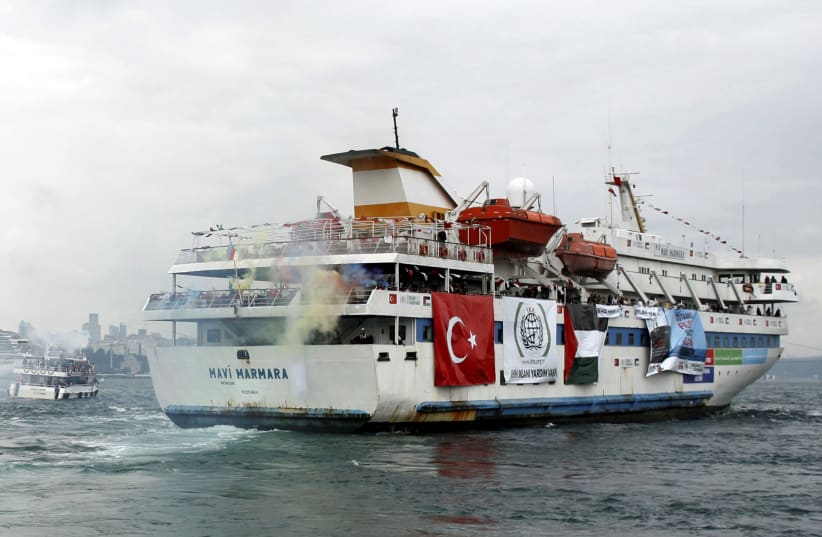The International Criminal Court’s top appeals chamber on Monday reopened the case of war crimes allegations relating to the 2010 Mavi Marmara flotilla.
After years of attempting to go after top Israeli political and military officials in Turkish and European courts and before the ICC – for the deaths of 10 mostly IHH Humanitarian Relief Foundation activists killed by Israel Navy commandos – the split decision of the ICC Appeals Chamber keeps the case alive, although it does not mean that Israel will lose.
ICC prosecutor Fatou Bensouda can go further with criminally probing Israel, or she can decide to try closing the case for a third time, although her basis for doing so has narrowed.The 2010 Mavi Marmara raid saw a group of rights activists, combined with a smaller group of IHH activists – which the quasi-government Turkel Commission Report identified as affiliated with the Muslim Brotherhood – board several ships in an attempt to break Israel’s blockade of Hamas in Gaza.
The case, filed by IHH Turkish allies on the Comoro Islands has been among the most controversial ones within the ICC system, with multiple split votes and multiple rounds of appeals.
In November 2014, Bensouda tried closing the file for the first time, saying that while the IDF’s conduct in the incident seemed to her to display elements of war crimes, the 10 activists killed simply did not constitute a high enough body count to warrant her involvement, since she focuses on mass killings.
Bensouda’s decided to end her review of the Mavi Marmara raid at a preliminary stage – without ordering a full criminal investigation, let alone filing indictments. This was viewed by the pro-Israel side as a first ICC victory.
But then the court's Pretrial Chamber voted against Bensouda in a 2-to-1 split ruling over how to handle the flotilla raid, ordering her to open a full criminal investigation.
The prosecutor appealed to the ICC’s Appeals Chamber, and got a mixed result in November 2015.
In a close 3-to-2 vote against Bensouda’s appeal, the Appeals Chamber ordered her to review her conclusions a second time looking at some wider available information, but empowered her to come to the same decision as long as she performed that review.
In November 2017, she again decided to close the case against Israel’s soldiers.
After reviewing additional information, she explained that, even as “there is a reasonable basis to believe that war crimes were committed by some members of the Israel Defense Forces… no potential case arising from this situation can, legally speaking, be considered of ‘sufficient gravity’…therefore barring the opening of an investigation.”
Crucial to her decision was her finding that, “there was no reasonable basis to believe that the identified crimes were committed on a large scale or as part of a plan or policy.”
Comoros appealed again, and in November 2018, the ICC Pretrial Chamber again ordered Bensouda to reconsider her decision in a split 2-1 decision.
She appealed again to the Appeals Chamber, which led to Monday’s decision.
Previously, Israel has succeeded in closing a range of other international cases against the Jewish state regarding the flotilla. Turkey closed its cases against Israel after the two countries reached a deal in August 2016. The ICC case was the last big one still open.
While Israel commandeered and stopped most of the ships without incident, Israel Navy commandos boarded the Mavi Marmara and were attacked by IHH activists, leading to the injury of some commandos and the eventual deaths of 10 IHH activists.
Turkey and many others in the international community accused Israel of war crimes. But the Turkel Commission and the UN-sponsored Palmer Report not only cleared Israel of said crimes, but validated some of Israel’s claims of fighting in self-defense. The Palmer Report did say that some of the IDF’s use of force was excessive.
The war crimes complaint to the ICC in the case came from the Comoro Islands in May 2013. Because of the law firm that filed the complaint, many viewed the Comoros as undertaking the issue on behalf of various IHH-Turkish contacts.
Bensouda’s alleged war crimes preliminary examination of the 2014 Gaza war and the settlement enterprise is still open, although there are indications that in November or December she may announce significant developments.
